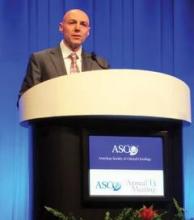CHICAGO – The long wait for a new medical therapy for advanced radioactive-refractory thyroid cancer is drawing to a close.
Twice-daily oral sorafenib (Nexavar) nearly doubled the median time to disease progression from 5.8 months with placebo to 10.8 months (hazard ratio, 0.587; P less than .0001) among 417 patients in the double-blind, international phase III DECISION study.
The benefit of sorafenib on this primary endpoint was seen across all patient characteristics, including age, histology, and geographic region, principal investigator Dr. Marcia S. Brose said during the plenary session at the annual meeting of the American Society of Clinical Oncology.
Median overall survival has not been reached for either arm, and will be strongly affected by the 71% of controls who crossed over to open-label treatment with the multikinase inhibitor.
No standard therapy exists for the 5%-15% of patients with thyroid cancer who are refractory to standard treatment with surgery and radioactive iodine (RAI). Doxorubicin (Adriamycin) chemotherapy was approved some 30 years ago, but it is ineffective and toxic.
"Sorafenib is a potential new treatment option for patients with locally advanced or metastatic radioactive-refractory differentiated thyroid cancer," said Dr. Brose, director of thyroid cancer therapeutics and head and neck clinical trials at the University of Pennsylvania, Philadelphia.
Approval sought in U.S. and abroad
DECISION (Study of sorafenib in locally advanced or metastatic patients with radioactive iodine refractory thyroid cancer) is the first phase III study to demonstrate treatment efficacy in this setting. Based on its results, a supplemental New Drug Application will be submitted for sorafenib by midyear in the United States, with global submissions to follow, according to study sponsors Bayer Healthcare Pharmaceuticals and Onyx Pharmaceuticals. The drug is already approved in the United States for advanced renal and liver cancer.
DECISION involved 417 patients in the United States, Europe, or Asia who had locally advanced or metastatic RAI-refractory differentiated thyroid cancer that had progressed within the previous 14 months and had received no prior chemotherapy, targeted therapy, or thalidomide. Patients received twice-daily sorafenib 400 mg or placebo. The majority had distant metastases (96%), 66% had papillary histology, and 61% had an ECOG performance status of 0. Their median age was 63 years.
Sorafenib did not induce any complete responses. Partial responses, defined by at least a 30% reduction in tumor size, occurred in 12.2% of sorafenib patients vs. 0.5% of controls, and lasted for a median of 10.2 months, Dr. Brose said. An additional 42% of patients experienced stable disease for more than 6 months, resulting in a disease control rate of 54% in the sorafenib arm vs. 34% in the placebo arm.
In all, 73% of sorafenib-treated patients had some tumor shrinkage, compared with 27% of placebo-treated patients, and this was often sufficient to relieve symptoms, she said.
It would have been nice to see more partial responses, but all responses were clinically meaningful, Dr. Brose said in an interview.
"Unlike other cancers, what’s interesting is that these patients can have 100 nodules in their chest and actually experience very few symptoms, but what will kill them is when those grow," she said. "So the more clinically important number that is going to prevent the hospitalizations and other complications is not so much the issue of response, but how long it lasts."
Whom and when to treat
Invited discussant Dr. Ezra Cohen, codirector of the head and neck cancer program at the University of Chicago Comprehensive Cancer Center, said not all iodine-refractory patients need treatment, noting that at 400 days, 25% of placebo-treated patients did not progress in DECISION.
The real question going forward is not whether all refractory differentiated thyroid cancer patients should receive sorafenib, but whom and when to treat, he said. Factors that will come into play are whether the patient is symptomatic, the location of the disease and whether that location will portend the onset of symptoms in the near future, and the growth rate of their anatomic disease.
"What you don’t see on this list is the change in chemical factors, and that is specifically thyroid globulin," Dr. Cohen said. "The rise in thyroid globulin, while often important to patients, in my opinion should not be used as a criterion to initiate therapy."
He pointed out that other vascular endothelial growth factor (VEGF) receptor inhibitors are currently being evaluated in iodine-refractory differentiated thyroid cancer, including the ongoing phase III trial of lenvatinib (NCT01321554). "If I had to guess, it will reinforce the data we just saw with sorafenib," he added.


